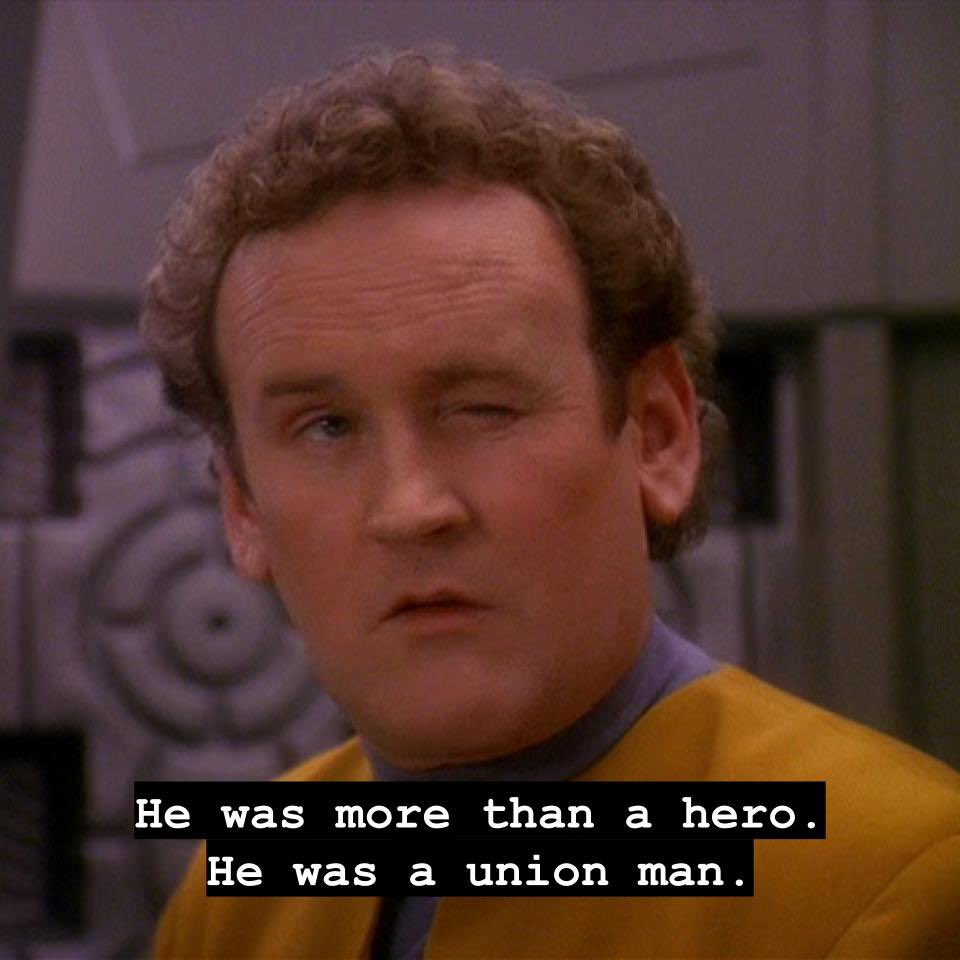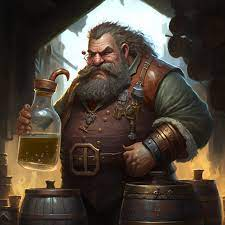My first character was a “muppet-born” named Ché-Elmo, who interacted with the group over video chat directly (a hand-puppet Elmo with a red star cap was all they saw and heard), and was a Warlock who had made a pact with the being Carl Marx in exchange for power. His tome of power was Das Kapital, which I’d have him leaf through while we played.
He went missing a few years ago; it’s my belief that he’s out there now in some other dimension still sticking it to every merchant he encounters.
Im unsure of Ché-Elmo is a reference or pun but the rest of that is gold
Lmao nice!
I’m terrible at coming up with backstories. I guess that means I don’t have any insecurities.
Can you remember the first time you felt insecure about your ability to come up with backstories? What was that like? And so on
Now consider, how would those insecurities look with elf ears? What about horns and a tail?
A bard who invented the “unicorn vomit metal” genre, purely because I found a hilarious combination clicking random a bunch in BG3.
Yellow Slayer face paint with Harley Quinn cotton candy hairI deliberately create characters which have an interesting dynamic with other player’s characters.
That either tells you nothing about me, or everything about me.
Well, you sound like a team player. You place the common good (fun together) higher than individual ambitions (or maybe place your own worth very low, I can’t tell from one sentence, but the outcome is the same).
Saying deliberately sounds like it’s not just a thing that you find yourself doing again and again, but a conscious choice. That suggests there was a choice to make; that the option of playing a self-centered character was something you were actively aware of, but were sufficiently repulsed by it to make a point of being better than those people.
I think you’re a nice person, empathetic, while not so entirely innocent as to not even consider the possibility, still principled and caring enough to actively defy it.
I think you’re a net good for this world.
To put forth a counterpoint, they could be afraid to express their individuality and use team synergy as a (albeit positive) mechanism of avoiding that.
Hell, that makes me think of myself. I hate playing tank in mmorpgs because they’re always the leader in dungeons. They set the pace and have to keep aggro and proper boss facing and that’s a lot of pressure I don’t enjoy. I prefer healing because while still being a crucial and potentially stressful role, I’m not “in charge.”
We learning about ourselves today, huh?
I considered that option too, but opted to go with the more positive guess. I’m not qualified either way, I just wanted to say something nice.
Just providing discussion. I prefer your interpretation as well.
I appreciate that you took the time to supply the nuances I omitted. While there is value in a positive framing, it’s important to acknowledge potential struggles as well. We can’t effectively tackle issues if we’re not aware of them.
In any case, while I’m not qualified to help you with your difficulties, I hope you find - or have found - a way to work on overcoming them. Dealing with insecurities, from my own experience, can be a tough process, further amplified by setbacks and a lack of perceived progress. But if you persevere, even if you might not feel that you have improved much, you may find yourself looking back at a time when it was worse and, by contrast, see the progress you’ve made. May that hope, that your future self will look back and be proud of your hard work, give you the strength to keep going.
That is so kind of you to say. Thank you!
You’re either an Aquarius or a Libra.
Sir, this is serious business. Please take your absurd fantasies elsewhere.
Which one is cooler? Cause I’m that one.
My characters often end up exasperated by how idiotic and chaotic the other characters players are. That checks out.
“So the walls started bleeding, a thousand voices cried out in pain, and a sinkhole into the unseen depths opened in the kitchen.”
“Right.”
“And you, a normal human with no magical powers or special equipment, you jumped into the sinkhole.”
“Yes.”
“Why?”
“It was there!”
“And then your character died, as one would expect from a hundred foot drop onto stone. And now?”
“I don’t understand. What else was I supposed to do??”
Ok, so, the trick is to make sure the NPC’s are the same way. That’ll really confuse the players.
Person jumps off a roof and splats in front of the party
player: “why did that happen?”
dm: “They had just purchased boots of flying from an untrustworthy source and figured this was the best way of testing them.”
Having the party run into a group of edgy adventurers is always a fun time.
Sounds about right
My main has an invisible ring of mind shielding, and is (still unbeknownst to the rest of the party) actually the possessed body of the person who killed me and stole my ring.
I just now realized I built my impostor syndrome into my DnD character.
My character is 17 (actually 23 due to dimesional fuckery), has published a math textbook, and is trying really hard to not murder people anymore. He’s also firmly on the blue and orange morality spectrum, loves teaching literally anything at any time, and is disgusted by the concept of the afterlife. Fun guy. Wonder what a therapist would make of him
You are immature for your age and try to now grow up. You think you are smarter than most people, which you are, but not by as much as you think. For that reason you struggle with impostor syndrome and hold yourself back from achieving the career you actually want. But still you manage to come off as condescending to people around you.
Please don’t take this seriously.
Everything is correct except the last line, but only because I have poured a tremendous amount of effort into it (and I still slip up sometimes). Making the person I’m talking to not feel judged or condescended to is actually my most well-developed skill, very important for the education field.
That’s awesome and really shows we can learn skills which dont align with our natural tendencies.
Also I find it hilarious and a bit scary how accurate this was then.
“Please stop!…I don’t like being seen”
Lmao i make my characters expressly a facet of myself in somse way, deliberately. Ive made several characters in the past few years since a big mental breakdown event, its interesting how much mileage a pc can get out of a little trauma!
Best part is that these characters have helped me iron out personal wrinkles in a way that therapy couldn’t. Im still doing therapy tho lol.
…likewise, each character is different distillation of some aspect of my own personality; it’s kind of an integral part of the character creation process for me to figure out who they are and properly get into character…
Hey, as a random Internet stranger I’m just going to say that I’m proud of you. Everyone has their own path to becoming a better them and I’m glad you’re doing the things that work for you. Keep it up!
“I am normally the DM”
“You either have trust issues or ADHD”
Goddamnit
Well, I don’t have trust issues…
Damnit, did you just diagnose me over the internet?
I only trust myself to show up to scheduled meetings.
What if it’s both?
Cue the scene in critical role campaign 1 where talesin PC (Percy)'s demon jumps our of his body and his party rolls initiative.
“We’re actually fighting my demons. My therapist would be so proud right now.”
I heard a story about a therapist that used RPGs as a tool to diagnose patients. They held group sessions with several patients and then had a private session with each of them to debrief.
I’m convinced a lot of things can reflect on the way people play and make up their character.
There’s a book called Tabletop Role-playing Therapy: A Guide for the Clinician Game Master by Dr Megan A. Connel that’s a really standout resource about this, she appeared on the official D&D podcast a year or so ago talking about it.
I’d say that this is more a resource for therapists to use TTRPGs than it is for DMs to act as therapists for their players. There’s a fine line between accommodating your players’ preferences and needs and providing unwanted therapy; if you want to actually put any therapy techniques into your game, ask your players approval first.
I just went looking for this. Here’s a link to the podcast for everyone else: https://pca.st/episode/b8388458-0062-47c5-a259-fae295a45305
Every work of artistic expression, from painting, through photography, all the way to fantasy improv, is a little window into who you are
the imaginary you is being put in various situations, mysteries, plots, and they have to figure out their way to victory! (and at the same time reveal exactly how you appraoch problem solving, how your logic works, and what assumptions you make)
it’s like the random shapes test but you don’t even realise you’re doing it
though it could get significantly harder to see through the layers of fantasy if you’re dealing with experienced roleplayers playing their 50th character
Something clicked reading this comment and I realized how much my tabletop roleplay matches the way I approach conflict in real life. I always go for high charisma and try to talk down enemies and resolve through dialogue. I’ll usually go for persuasion before deception and intimidation. Likewise I’m super averse to lying and getting in heated arguments in my real life encounters.
Hmm.
Not mirrors but characters are the mirror to our soul :D
Sometimes, especially in fun one-shot I prepare pretty wild pre-gen, and always think I hope a therapist won’t read these characters :)







